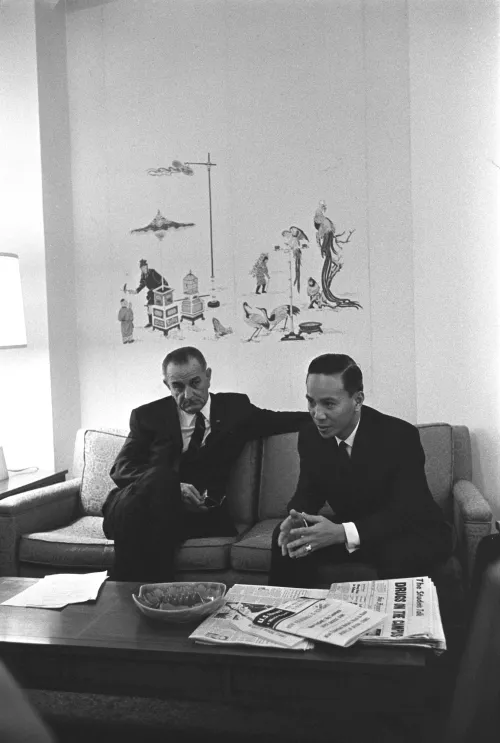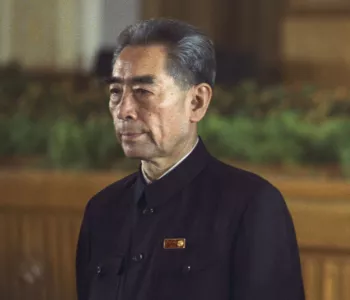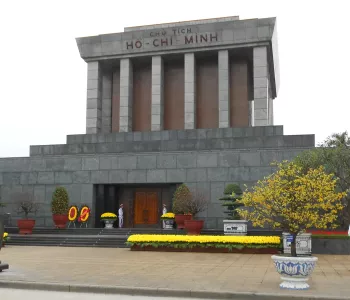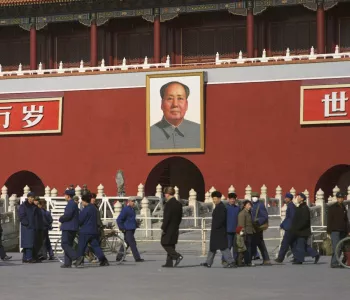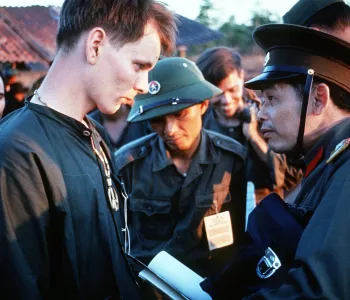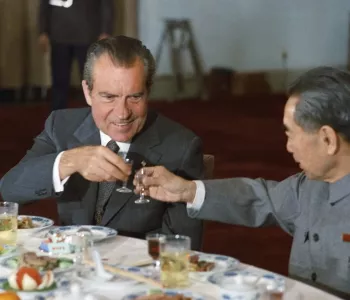Thieu, the son of a small landowner, was born in Ninh Thuan and educated in a Roman Catholic secondary school in Hue. Originally a Buddhist, he converted to Roman Catholicism when he married a doctor’s daughter.
He briefly joined Ho Chi Minh’s Viet Minh after World War II but left because of its Communists leanings. Later he attended National Military Academy in Hue and fought for the French against the Viet Minh.
After 1954 Thieu rose through the ranks of the South Vietnamese army to become a general in 1962. One of the leaders in the 1963 coup that toppled President Ngo Dinh Diem, he emerged two years later as head of state.
He served as chief of state under Nguyen Cao Ky from 1965-67.
In 1967 Thieu won the presidency under a new constitution, and was reelected in 1971 after a campaign of intimidation. An unbending anti-Communist, he presided over a dictatorial regime that opposed any United States settlement with North Vietnam and the National Liberation Front.
Shortly before the final Communist victory in 1975, Thieu resigned and went into exile, first in Taiwan, then in England, and finally in the United States. Nguyen Van Thieu died in Boston on 29th September, 2001.
His lifestyle in retirement was in sharp contrast to his days as head of South Vietnam, when he ruled with a tough, some said dictatorial style. A free-market capitalist, he advocated fierce resistance to the hardline communist North Vietnamese, bitterly opposing any concessions even as the South Vietnamese army crumbled under sustained assault.
But in the end, as the North Vietnamese troops moved steadily into the south, his links with the United States became his greatest weakness because the North refused to negotiate with him or his administration. Thieu had long been anathema to the Viet Cong and North Vietnamese, who had labeled him a "traitor, a murderer and a seller of his people's blood."
When finally forced out, Thieu went bitterly, blaming his one-time patrons the Americans who, he said, had been "blind and deaf" to North Vietnamese violations of the Paris peace agreements, which took the last U.S. troops out of South Vietnam in 1973.
For Thieu, the surrender of Saigon was the total repudiation of all his efforts during the war. He had always claimed to want peace, but never in the way it finally came.
Corruption was rife in South Vietnam and the president was often accused by opponents of becoming increasingly dictatorial and intolerant of opposition. It was alleged, but never proven, that he had three-and-a-half tons of gold flown out of Saigon by cargo aircraft when he stepped down.
Never a very popular leader, he was unable to turn the tide against the Communist North despite the assistance of 500,000 U.S. troops and massive amounts of military aid. He left power in a last-ditch effort by the South to negotiate with the North for creation of a coalition government. But by then key provincial capitals were falling speedily to invading Communist troops and the North had no interest in a deal.
